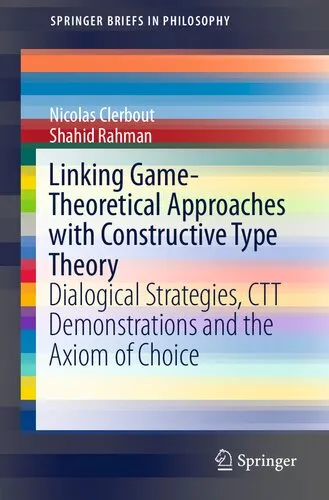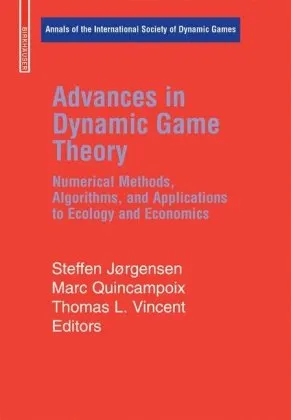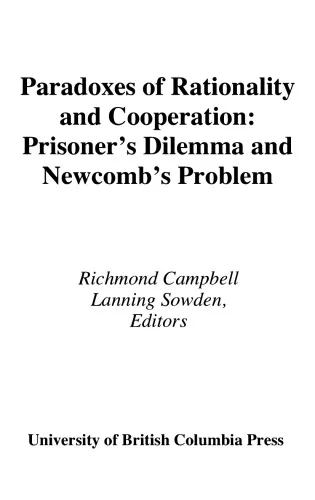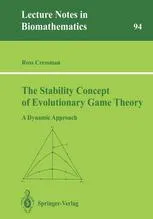Linking Game-Theoretical Approaches with Constructive Type Theory: Dialogical Strategies, CTT demonstrations and the Axiom of Choice
4.9
Reviews from our users

You Can Ask your questions from this book's AI after Login
Each download or ask from book AI costs 2 points. To earn more free points, please visit the Points Guide Page and complete some valuable actions.Related Refrences:
Introduction to "Linking Game-Theoretical Approaches with Constructive Type Theory"
"Linking Game-Theoretical Approaches with Constructive Type Theory: Dialogical Strategies, CTT demonstrations and the Axiom of Choice" is a carefully crafted exploration at the intersection of logic, philosophy, mathematics, and computer science. Through the lens of dialogical logic and Constructive Type Theory (CTT), the book delves into the depths of reasoning, argumentation, and how these fields can support and influence each other. Authored by Nicolas Clerbout and Shahid Rahman, this scholarly text connects game-theoretical models with constructive reasoning systems, providing profound insights into essential topics like logical frameworks, formal proofs, and the philosophical implications of constructive methodologies.
At the center of this book is the innovative bridge it builds between dialogical logic—where reasoning is modeled as a strategic dialogue—and Constructive Type Theory, a form of logic rooted in constructivism. Special consideration is given to the Axiom of Choice, a principle that has sparked considerable debate in mathematical and philosophical circles. By incorporating dialogical strategies into CTT frameworks, the authors pave the way for new ways of thinking about constructive demonstrations.
Detailed Summary
This book is partitioned into rigorous chapters that slowly guide the reader toward a deeper understanding of its core themes. The journey begins with an exposition of dialogical logic, its historical development, and how it models reasoning as an interactive process. The authors explore the relationship between dialogue games and formal logic, showing how logical proofs can be represented as games between two players: the Proponent and the Opponent.
The text then transitions into Constructive Type Theory. CTT emphasizes constructivist principles, asserting that the existence of mathematical objects must be demonstrated through explicit construction. Grounded in Martin-Löf's Type Theory, CTT plays a crucial role in both foundational mathematics and computer science. The authors explicate how the tools of dialogical reasoning can be leveraged to enhance CTT demonstrations, making proofs more intuitive and interactive.
A central highlight of the book is the treatment of the Axiom of Choice. This controversial axiom, which asserts the ability to select a representative element from each set in a collection of nonempty sets, has profound philosophical and mathematical implications. Instead of merely exploring this axiom from traditional perspectives, the authors use dialogical strategies to illuminate its place within a constructive framework. They offer a nuanced view that integrates game-theoretical reasoning with constructive demonstrations, opening new research pathways for logicians and mathematicians.
Alongside its rich theoretical content, the book also provides practical applications. Readers will learn how the dialogical approach and CTT can be used to streamline logical proofs, enhance computation, and rethink notions of validity and constructibility in mathematics.
Key Takeaways
- Dialogical logic models reasoning as an interactive, game-like procedure, enriching our understanding of argumentative processes.
- By integrating dialogical strategies into Constructive Type Theory, we gain new methodologies for constructing proofs and understanding mathematical concepts.
- The Axiom of Choice is reinterpreted within a constructive framework, allowing for deeper insights into its mathematical and philosophical relevance.
- The collaboration between logic, computer science, and philosophy opens new perspectives on computational logic, proof theory, and foundational studies.
Famous Quotes from the Book
"Reasoning is not a solitary act but a dialogical process through which interlocutors exchange claims, justify positions, and collaboratively search for the truth."
"Constructive Type Theory transforms mathematical demonstrations into tools of creation, where existence is not assumed but brought into reality through explicit construction."
Why This Book Matters
"Linking Game-Theoretical Approaches with Constructive Type Theory" stands at the forefront of interdisciplinary research, drawing connections between philosophy, mathematics, and computer science. The dialogical framework not only reshapes our approach to logic but also bridges theoretical discussions with practical applications in computation and proof verification systems. For researchers and students alike, this text provides a unique perspective on fundamental issues surrounding reasoning, proof construction, and the philosophical tenets of constructivism. In a world reliant on formal logic to power technologies like programming languages and automated theorem provers, the ideas in this book are more relevant than ever.
Ultimately, the book is not just about new techniques for constructing proofs. It is about rethinking the process of reasoning itself—about understanding it as a collaborative, game-like process that aligns with the principles of constructive thought. As such, it appeals to anyone interested in deepening their knowledge of dialogical logic, CTT, or the philosophical underpinnings of modern mathematics.
Free Direct Download
You Can Download this book after Login
Accessing books through legal platforms and public libraries not only supports the rights of authors and publishers but also contributes to the sustainability of reading culture. Before downloading, please take a moment to consider these options.
Find this book on other platforms:
WorldCat helps you find books in libraries worldwide.
See ratings, reviews, and discussions on Goodreads.
Find and buy rare or used books on AbeBooks.
1249
بازدید4.9
امتیاز0
نظر98%
رضایتReviews:
4.9
Based on 0 users review
Questions & Answers
Ask questions about this book or help others by answering
No questions yet. Be the first to ask!













